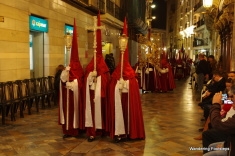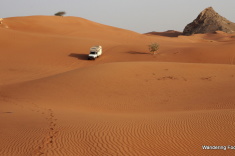The arc of this story might sound an awful like Spotting Kilimanjaro. But I swear it’s all true, that it really happened this way, again.
We were in Vwaza Marsh Wildlife Reserve in Northern Malawi, and we were there with a purpose – to see safari animals again. Readers may recall from The Failed Safarithat nine months have gone by without us spotting so much as an elephant!
And in fact, it was elephants that were on our minds as we drove toward Vwaza. We knew we wouldn’t stand a chance here with lion, rhinos, or giraffes, but with a little bit of luck we hoped to see one of the two hundred elephants that roam between Zambia and Malawi’s open border.
The road to reach Vwaza, deep in the heart of the country, was fascinating. We drove past rolling escarpment hills, jagged red cliffs poking like adult teeth out of the greenery. Village huts and small farms peppered the roadside. The deep purple stormy sky colored everything dramatic.
As the terrain flattened, the banana trees were replaced by tobacco plants. At first I didn’t recognize them – they were taller than a man, yellow and dry, and with the bottom half of the stalk plucked bare. This didn’t look at all like the tobacco plant I’d passed daily on the farm in Zimbabwe.
“It is tobacco,” maintained Bruno, when I challenged him. “See? Look over there – the leaves are being dried.”
And sure enough, on both sides of the road were tobacco leaves, hung upside down, their green slowly drying into yellow into brown. Unlike the large-scale production on the farm in Zimbabwe, however, here in Malawi, individual families were producing tobacco. They dried it on the verandas of their homes and inside rudimentary open-air straw shacks. Then, they walked or cycled it to town in big bales and sold it to auctioneers who would bring it to Lilongwe for international sale.
.jpg) |
| Malawian tobacco – tall, yellow, and plucked from the bottom. |
.jpg) |
| Tobacco leaves being dried under makeshift straw huts. |
Malawi’s tobacco business – one of its principle industries – is powered, once again, by small-scale farmers.
We pulled into Lake Kazuni Safari Camp inside Vwaza, only $37 more broke, a sharp and relieving contrast to East Africa’s parks. And what a picturesque sight we had before us – Lake Kazuni, absolutely chalk-full of belching hippos! Without a barrier between us and the lake, we were able to walk straight up to the edge, close enough to see incomplete sets of grimy teeth on the boasting hippos.
.jpg) |
| This guy needs a dentist! |
And that’s when we spotted them. Seven elephants, on the water’s edge, some forty meters away. Trotting toward us, the dominant male leading several females and young, their ears and trunks flapping side to side in perfect harmony.
“Quick, get the camera!,” I squealed to Bruno. He raced off, and I raced after him for the binoculars, desperate to see these elegant creatures close-up at last.
By the time Bruno and I returned to our lookout – a mere thirty seconds later – the elephants had disappeared.
“How could a group of such enormous beasts hide so efficiently,” I wondered, taken aback. And then, as disappointment set in, “Why did we have to rush off for our equipment? Why couldn’t we have stayed and just enjoyed the moment?”
“We’ve got a few days here, Britt. Don’t worry – they’ll show up again,” soothed Bruno, evidently reading my mind.
And so, we set in for the wait. We parked the Toyota, set up camp, and placed our table and chairs under the shade of a sausage tree, in perfect viewing position for the return of the elephants.
 |
| Our shade-giving lakeside sausage tree. Just watch out for falling sausages! |
We waited, and watched. We didn’t even go for a game drive – after the rains, the bush was too thick, anyway. Besides, waiting had always been our safari strategy and patience had proven successful many times before.
Over the course of the afternoon, baboons, vervet monkeys, warthogs, and impala came to drink at Lake Kazuni. The hippos sunned themselves pink on a nearby island filled with birds. But the elephants never returned to the water.
 |
| The view from Kazuni Safari Camp! |
 |
| Bird and hippo island. |
 |
| This vervet monkey is sneakily eating something before his mates find out! |
I turned my attention to the camp’s facilities. They were in massive need of some good ol’ TLC. We’d been given the keys to a chalet because the camp’s ablution block was no longer in working order. It seemed the chalet wasn’t far from that state, either. Barely a trickle of water came from the tap, the toilet –when it flushed – leaked sewage out the broken pipe outside, and the shower head was barren.
“The government has neglected this park for a long time,” admitted Godwin, the camp attendant. “We do the best we can with what we’ve got.” And with that Malawian look of resigned creativity, he went to fetch us a few buckets of water.
“Elephant! Elephant!,” shouted Bruno as I finished washing the dinner dishes in the water bucket reserved for toilet flushing.
I raced outside. And indeed, walking past us at the lake’s edge, was a young bull. The only problem was that the moon hadn’t risen yet and we could barely make out his silhouette darkness of the African night.
Surely Vwaza’s elephants were taunting us!
The next morning, we popped out of bed with the sun, confident today would be an elephant-filled day. It wasn’t. Well, not exactly. We did spot elephants, twice. But both times, the elephants were very far away, and they approached the water only briefly, visibly nervous.
“Truth be told, poaching is still a problem in Vwaza,” admitted a game ranger we stopped to chat with. Organized large-scale ivory poaching isn’t the problem. It’s the poaching being done by surrounding villagers, for bush meat, that’s making all our animals so nervous.”
Bush meat is more often antelope and warthog meat than elephant. But with the ever-increasing population in this densely-populated country – not to mention the dire poverty – villages encroach on protected land throughout Malawi. This affects all wild animals, whether or not they are the direct targets of bush meat poachers.
Was this the reason Vwaza’s elephants were making themselves so scarce?
By the third morning, I was admittedly frustrated with our lack of proper elephant success. The grey, cold and rainy skies seemed to mimic my mood.
We went for a little bush walk (technically illegal without a guide, but Bruno is kind of like one) because I needed to feel proactive about our elephant hunt. We spotted the huge oval tracks and the fresh barnyard-hay smell of droppings that proved elephants were around. They’d just chosen to make themselves invisible to us.
So I passed the time. I read, I wrote emails, I cooked food. And I realized I was being grumpy and that my elephant obsession was preventing me from appreciating what Vwaza was giving us – grunting hippos spying on us from the water, birds floating past us, monkeys and baboons causing noisy havoc in the nearby chalet, and picture-perfect rainy season lakeside sunsets.
 |
| Each evening,we admired colorful sunsets over Lake Kazuni. |
 |
| This is how I admire sunsets – with beer and peanuts! |
 |
| Hippo spying on us from the water. |
I pushed my book away and joined Bruno for beer and peanuts under the lookout tree. At that moment, an elephant emerged under his own lookout tree on the other side of the lake.
And then, a few more elephants materialized. Seven, nine, no, eleven elephants. A proper herd!
They were far, but I forced myself to enjoy the moment, assuming it would be the best we would get.
Yet, the dominant male wasslowly making his way up the shore, ever closer to us. His herd dawdled, behind him. They stopped to munch at trees, roll in the mud, and drink from the water, but they were definitely drawing nearer.
One hundred meters, seventy meters, fifty meters, forty meters. They were now in the exact spot where we had spotted the elephants on our first day, when we’d stupidly rushed off for our camera and binoculars.
This time, we weren’t going anywhere. This time, I already had my binoculars.
The elephants didn’t stay long, but I was thankful nonetheless for I had savored this moment, knowing it would be fleeting. It had been enough. Vwaza had given us what we had sought. I went to take my bucket shower.
 |
| There must be something yummy in the roots of this tree. |
 |
| The herd of 11, being led by the dominant male, slowly approaching our camp. |
Through the decaying walls of the bathroom, I heard a sort of crunching sound, like the crunching of leaves on feet. Then, the crunching sound was mingled with the tearing of branches. It was undeniably an elephant symphony.
I raced out to join Bruno on the chalet veranda, where he was already staring at the grey masses through the thick bush. The flicker of a floppy ear, the movement of a white tusk.
The entire herd of elephants was grazing in the bush, mere meters from us. And this time, they didn’t seem in a hurry to disappear.
 |
| The elephant munching on leaves mere meters from our chalet. |
Through the trees, a snout emerged, sniffing us out. A large male elephant turned to face us, Dumbo ears out wide. A warning – don’t come closer.
But we wouldn’t have dreamed of it. We didn’t need to be closer. We were perfectly close enough, at last getting our long-awaited dose of elephant.
 |
| Don’t come closer! |


